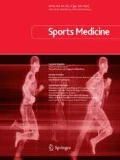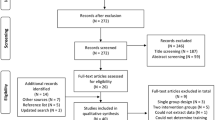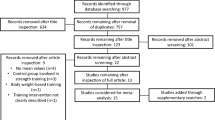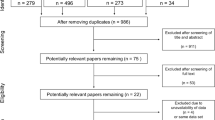Abstract
Background
The importance of trunk muscle strength (TMS) for physical fitness and athletic performance has been demonstrated by studies reporting significant correlations between those capacities. However, evidence-based knowledge regarding the magnitude of correlations between TMS and proxies of physical fitness and athletic performance as well as potential effects of core strength training (CST) on TMS, physical fitness and athletic performance variables is currently lacking for trained individuals.
Objective
The aims of this systematic review and meta-analysis were to quantify associations between variables of TMS, physical fitness and athletic performance and effects of CST on these measures in healthy trained individuals.
Data Sources
PubMed, Web of Science, and SPORTDiscus were systematically screened from January 1984 to March 2015.
Study Eligibility Criteria
Studies were included that investigated healthy trained individuals aged 16–44 years and tested at least one measure of TMS, muscle strength, muscle power, balance, and/or athletic performance.
Study Appraisal and Synthesis Methods
Z-transformed Pearson’s correlation coefficients between measures of TMS and physical performance were aggregated and back-transformed to r values. Further, to quantify the effects of CST, weighted standardized mean differences (SMDs) of TMS and physical performance were calculated using random effects models. The methodological quality of CST studies was assessed by the Physiotherapy Evidence Database (PEDro) scale.
Results
Small-sized relationships of TMS with physical performance measures (−0.05 ≤ r ≤ 0.18) were found in 15 correlation studies. Sixteen intervention studies revealed large effects of CST on measures of TMS (SMD = 1.07) but small-to-medium-sized effects on proxies of physical performance (0 ≤ SMD ≤ 0.71) compared with no training or regular training only. The methodological quality of CST studies was low (median PEDro score = 4).
Conclusions
Our findings indicate that TMS plays only a minor role for physical fitness and athletic performance in trained individuals. In fact, CST appears to be an effective means to increase TMS and was associated with only limited gains in physical fitness and athletic performance measures when compared with no or only regular training.









Similar content being viewed by others
References
Stølen T, Chamari K, Castagna C, et al. Physiology of soccer: an update. Sports Med. 2005;35(6):501–36.
Ziv G, Lidor R. Vertical jump in female and male volleyball players: a review of observational and experimental studies. Scand J Med Sci Sports. 2010;20(4):556–67.
Cometti G, Maffiuletti NA, Pousson M, et al. Isokinetic strength and anaerobic power of elite, subelite and amateur French soccer players. Int J Sports Med. 2001;22(1):45–51.
Lawton TW, Cronin JB, McGuigan MR. Strength testing and training of rowers: a review. Sports Med. 2011;41(5):413–32.
Vandorpe B, Vandendriessche J, Vaeyens R, et al. Factors discriminating gymnasts by competitive level. Int J Sports Med. 2011;32(8):591–7.
Ebben WP, Kindler AG, Chirdon KA, et al. The effect of high-load vs. high-repetition training on endurance performance. J Strength Cond Res. 2004;18(3):513–7.
Rønnestad BR, Hansen J, Hollan I, et al. Strength training improves performance and pedaling characteristics in elite cyclists. Scand J Med Sci Sports. 2015;25(1):e89–98.
Sander A, Keiner M, Wirth K, et al. Influence of a 2-year strength training programme on power performance in elite youth soccer players. Eur J Sport Sci. 2013;13(5):445–51.
Verstegen M, Williams P. Core performance: the revolutionary workout program to transform your body and your life. New York: Rodale Inc.; 2005.
Brittenham G, Taylor D. Conditioning to the core. Champaign: Human Kinetics; 2014.
Akuthota V, Ferreiro A, Moore T, et al. Core stability exercise principles. Curr Sports Med Rep. 2008;7(1):39–44.
Kibler WB, Press J, Sciascia A. The role of core stability in athletic function. Sports Med. 2006;36(3):189–98.
Granacher U, Gollhofer A, Hortobágyi T, et al. The importance of trunk muscle strength for balance, functional performance, and fall prevention in seniors: a systematic review. Sports Med. 2013;43(7):627–41.
Blache Y, Monteil K. Influence of lumbar spine extension on vertical jump height during maximal squat jumping. J Sports Sci. 2014;32(7):642–51.
Lamb DH. A kinematic comparison of ergometer and on-water rowing. Am J Sports Med. 1989;17(3):367–73.
Andersson E, Swärd L, Thorstensson A. Trunk muscle strength in athletes. Med Sci Sports Exerc. 1988;20(6):587–93.
Miltner O, Siebert C, Tschaepe R, et al. Volleyballspezifische Rumpfmuskelkraft bei professionellen und nicht professionellen Volleyballspielern. Z Orthop Unf. 2010;148(2):204–9.
Willson JD, Dougherty CP, Ireland ML, et al. Core stability and its relationship to lower extremity function and injury. J Am Acad Orthop Surg. 2005;13(5):316–25.
Hibbs AE, Thompson KG, French D, et al. Optimizing performance by improving core stability and core strength. Sports Med. 2008;38(12):995–1008.
Borghuis J, Hof AL, Lemmink KAPM. The importance of sensory-motor control in providing core stability: implications for measurement and training. Sports Med. 2008;38(11):893–916.
Reed CA, Ford KR, Myer GD, et al. The effects of isolated and integrated ‘core stability’ training on athletic performance measures: a systematic review. Sports Med. 2012;42(8):697–706.
Liberati A, Altman DG, Tetzlaff J, et al. The PRISMA statement for reporting systematic reviews and meta-analyses of studies that evaluate healthcare interventions: explanation and elaboration. BMJ. 2009;339:b2700.
Caspersen CJ, Powell KE, Christenson GM. Physical activity, exercise, and physical fitness: definitions and distinctions for health-related research. Public Health Rep (Wash, DC 1974). 1985;100(2):126–31.
Lesinski M, Hortobágyi T, Muehlbauer T, et al. Dose-response relationships of balance training in healthy young adults: a systematic review and meta-analysis. Sports Med. 2015;45(4):557–76.
Tse MA, McManus AM, Masters RSW. Development and validation of a core endurance intervention program: implications for performance in college-age rowers. J Strength Cond Res. 2005;19(3):547–52.
Szymanski DJ, Szymanski JM, Bradford TJ, et al. Effect of twelve weeks of medicine ball training on high school baseball players. J Strength Cond Res. 2007;21(3):894–901.
Mallen C, Peat G, Croft P. Quality assessment of observational studies is not commonplace in systematic reviews. J Clin Epidemiol. 2006;59(8):765–9.
Maher CG, Sherrington C, Herbert RD, et al. Reliability of the PEDro scale for rating quality of randomized controlled trials. Phys Ther. 2003;83(8):713–21.
Kenny DA. Statistics for the social and behavioral sciences. Boston: Little, Brown; 1987.
Hedges LV, Olkin I. Statistical methods for meta-analysis. Orlando: Academic Press; 1985.
Vincent WJ, Weir JP. Statistics in kinesiology. 4th ed. Champaign: Human Kinetics; 2012.
Cohen J. Statistical power analysis for the behavioral sciences. 2nd ed. Hillsdale: Erlbaum; 1988.
Clayton MA, Trudo CE, Laubach LL, et al. Relationships between isokinetic core strength and field based athletic performance tests in male collegiate baseball players. J Exerc Physiol. 2011;14(5):20–30.
McKean MR, Burkett B. The relationship between joint range of motion, muscular strength, and race time for sub-elite flat water kayakers. J Sci Med Sport. 2010;13(5):537–42.
Prieske O, Muehlbauer T, Krueger T, et al. Role of the trunk during drop jumps on stable and unstable surfaces. Eur J Appl Physiol. 2015;115(1):139–46.
Sharrock C, Cropper J, Mostad J, et al. A pilot study of core stability and athletic performance: is there a relationship? Int J Sports Phys Ther. 2011;6(2):63–74.
Shinkle J, Nesser TW, Demchak TJ, et al. Effect of core strength on the measure of power in the extremities. J Strength Cond Res. 2012;26(2):373–80.
Vanlandewijck YC, Verellen J, Beckman E, et al. Trunk strength effect on track wheelchair start: implications for classification. Med Sci Sports Exerc. 2011;43(12):2344–51.
Gordon AT, Ambegaonkar JP, Caswell SV. Relationships between core strength, hip external rotator muscle strength, and star excursion balance test performance in female lacrosse players. Int J Sports Phys Ther. 2013;8(2):97–104.
Butcher SJ, Craven BR, Chilibeck PD, et al. The effect of trunk stability training on vertical takeoff velocity. J Orthop Sports Phys Ther. 2007;37(5):223–31.
Kim K. Effects of core muscle strengthening training on flexibility, muscular strength and driver shot performance in female professional golfers. Int J Appl Sports Sci. 2010;22(1):111–7.
Aggarwal A, Zutshi K, Munjal J, et al. Comparing stabilization training with balance training in recreationally active individuals. Int J Ther Rehabil. 2010;17(5):244–51.
Amorim TP, Sousa FM, Santos JARD. Influence of Pilates training on muscular strength and flexibility in dancers. Mot Rev Educ Fis. 2011;17(4):660–6.
Mills JD, Taunton JE, Mills WA. The effect of a 10-week training regimen on lumbo-pelvic stability and athletic performance in female athletes: a randomized-controlled trial. Phys Ther Sport. 2005;6(2):60–6.
Saeterbakken AH, van den Tillaar R, Seiler S. Effect of core stability training on throwing velocity in female handball players. J Strength Cond Res. 2011;25(3):712–8.
Sato K, Mokha M. Does core strength training influence running kinetics, lower-extremity stability, and 5000-M performance in runners? J Strength Cond Res. 2009;23(1):133–40.
Jamison ST, McNeilan RJ, Young GS, et al. Randomized controlled trial of the effects of a trunk stabilization program on trunk control and knee loading. Med Sci Sports Exerc. 2012;44(10):1924–34.
Keogh JWL, Aickin SE, Oldham ARH. Can common measures of core stability distinguish performance in a shoulder pressing task under stable and unstable conditions? J Strength Cond Res. 2010;24(2):422–9.
Hoppe MW, Freiwald J, Baumgart C, et al. Relationship between core strength and key variables of performance in elite rink hockey players. J Sports Med Phys Fit. 2015;55(3):150–7.
Nesser TW, Huxel KC, Tincher JL, et al. The relationship between core stability and performance in division I football players. J Strength Cond Res. 2008;22(6):1750–4.
Nesser TW, Lee WL. The relationship between core strength and performance in Division I female soccer players. J Exerc Physiol. 2009;12(2):21–8.
Okada T, Huxel KC, Nesser TW. Relationship between core stability, functional movement, and performance. J Strength Cond Res. 2011;25(1):252–61.
Ambegaonkar JP, Mettinger LM, Caswell SV, et al. Relationships between core endurance, hip strength, and balance in collegiate female athletes. Int J Sports Phys Ther. 2014;9(5):604–16.
Lin K, Huang Y, Tang W, et al. Correlation of static and dynamic trunk muscle endurance and bat swing velocity in high school aged baseball players. Isokinet Exerc Sci. 2013;21(2):113–9.
Wells GD, Elmi M, Thomas S. Physiological correlates of golf performance. J Strength Cond Res. 2009;23(3):741–50.
Durall CJ, Udermann BE, Johansen DR, et al. The effects of preseason trunk muscle training on low-back pain occurrence in women collegiate gymnasts. J Strength Cond Res. 2009;23(1):86–92.
Lust KR, Sandrey MA, Bulger SM, et al. The effects of 6-week training programs on throwing accuracy, proprioception, and core endurance in baseball. J Sport Rehabil. 2009;18(3):407–26.
Stanforth D, Stanforth PR, Hahn SR, et al. A 10-week training study comparing resistaball® and traditional trunk training. J Dance Med Sci. 1998;2(4):134–40.
Stanton R, Reaburn PR, Humphries B. The effect of short-term Swiss ball training on core stability and running economy. J Strength Cond Res. 2004;18(3):522–8.
Tong TK, McConnell AK, Lin H, et al. ‘Functional’ inspiratory and core muscle training enhances running performance and economy. J Strength Cond Res. 2014. [Epub ahead of print].
Weston M, Hibbs AE, Thompson KG, et al. Isolated core training improves sprint performance in national-level junior swimmers. Int J Sports Physiol Perform. 2015;10(2):204–10.
Stuber KJ, Bruno P, Sajko S, et al. Core stability exercises for low back pain in athletes: a systematic review of the literature. Clin J Sports Med. 2014;24(6):448–56.
Bliss LS, Teeple P. Core stability: the centerpiece of any training program. Curr Sports Med Rep. 2005;4(3):179–83.
Hodges PW, Richardson CA. Contraction of the abdominal muscles associated with movement of the lower limb. Phys Ther. 1997;77(2):132–42.
Chaudhari AMW, McKenzie CS, Borchers JR, et al. Lumbopelvic control and pitching performance of professional baseball pitchers. J Strength Cond Res. 2011;25(8):2127–32.
Kraemer WJ, Ratamess NA. Fundamentals of resistance training: progression and exercise prescription. Med Sci Sports Exerc. 2004;36(4):674–88.
Behm DG, Sale DG. Velocity specificity of resistance training. Sports Med. 1993;15(6):374–88.
Bressel E, Willardson JM, Thompson B, et al. Effect of instruction, surface stability, and load intensity on trunk muscle activity. J Electromyogr Kinesiol. 2009;19(6):e500–4.
Bruhn S, Kullmann N, Gollhofer A. Combinatory effects of high-intensity-strength training and sensorimotor training on muscle strength. Int J Sports Med. 2006;27(5):401–6.
Author information
Authors and Affiliations
Corresponding author
Ethics declarations
Funding
This study is part of the research project “Resistance Training in Youth Athletes” that was funded by the German Federal Institute of Sport Science (ZMVI1-081901 14-18).
Conflicts of interest
Olaf Prieske, Thomas Muehlbauer, and Urs Granacher declare that they have no conflicts of interest relevant to the content of this review.
Rights and permissions
About this article
Cite this article
Prieske, O., Muehlbauer, T. & Granacher, U. The Role of Trunk Muscle Strength for Physical Fitness and Athletic Performance in Trained Individuals: A Systematic Review and Meta-Analysis. Sports Med 46, 401–419 (2016). https://doi.org/10.1007/s40279-015-0426-4
Published:
Issue Date:
DOI: https://doi.org/10.1007/s40279-015-0426-4




